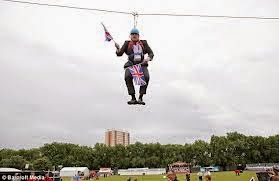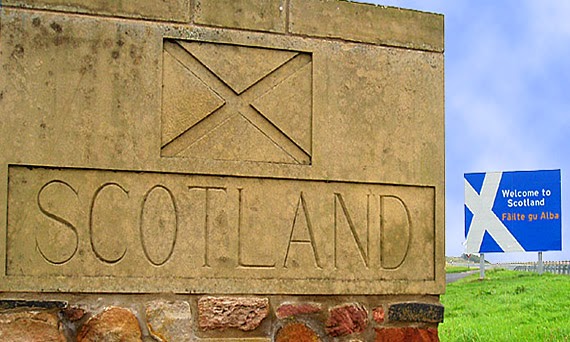Dr Johnson described patriotism as the last refuge of a scoundrel, but we still seem to treat “patriot” as an inherently favourable term to this day.
It seems to me that George Bernard Shaw got it right, when he said that “patriotism is your conviction that this country is superior to all others because you were born in it.”
One of my favourite writers is Ursula Le Guin, whose books present themselves as Science Fiction, but only use the genre as a vehicle for searing insights into humanity.
“How does one hate a country, or love one?” asks a character in one of her best novels, The Left Hand of Darkness, “I know people, I know towns, farms, hills and rivers and rocks... but what is the sense of giving a boundary to all that, of giving it a name and ceasing to love where the name ceases to apply? What is love of one’s country; is it hate of one’s uncountry?”
 |
| A glorious landscape that I love But if Scotland votes "Yes" it'll be abroad Should I love it less then? |
That’s the central issue. Love of country is closely linked to hatred of other countries. We call the latter nationalism rather than patriotism: Charles de Gaulle claimed that “Patriotism is when love of your own people comes first; nationalism, when hate for people other than your own comes first.” Curiously, though, I’ve recently had a personal experience showing that how little separates them.
I recently posted about how government, in Britain but not in Britain alone, is reacting to terrorist threats from abroad by trying to weaken key rights at home. An (inevitably anonymous) commenter wrote:
“My god are you the most un nationalistic individual in the entire UK not a single patriotic instinct in your entire body or mind.”
The writer’s tone suggests we can take him for a patriot. Indeed, for a him: his aggression suggests masculinity. Or is it perhaps that I suspect he tends to talk a load of balls?
He feels I have no nationalism or patriotism – note that he makes no distinction – but hasn’t realised that I regard such a judgement as a compliment. Britain isn’t better than anywhere else because I was born there (as it happens, I wasn’t – I’m certainly English by birth, but I was born abroad. Has that influenced my viewpoint? I rather suspect it has).
Britain’s better than many places because, among other things, it has a legal system which aspires, at least, to such principles as the presumption of innocence, and a political system which, when it resists attack from government or a particularly debased press, upholds freedom of thought, speech and assembly. It is no better than anywhere else that tries to apply those principles; and if it gives then up, it will be a lot worse.
We do Britain, or any other country, a disservice when unthinking patriotism allows our leaders casually to take such liberties away.
It seems the author of the comment on my post has grasped none of that. Like Ursula Le Guin, I see no good reason to draw an artificial boundary at a geographical line and stop my love there. That doesn’t stop me loving what is most admirable in my country.
But my country seems intent on undermining much of what gives it most value, a health service free at the point of care, a willingness to look after the vulnerable, a commitment to educate our children. As it seems intent on whipping up a climate of fear to undermine our rights. Just yesterday, the terrorist alert level was raised to severe, though no one expects any kind of terrorist attack and deaths from terrorist action can be counted on the fingers of one maimed hand; by contrast, 1730 people died on the roads in the year to june 2013.
However, what David Cameron announced yesterday wasn’t a new initiative against bad driving, it was a move to make it possible to take away people’s passports on suspicion of terrorism. On suspicion.
All this is because of the violent success of ISIS in the Middle East. For which, I might add, the United States and Britain bear a major share of responsibility, through their invasion of Iraq. And yet we surely know which Britons have travelled to fight with ISIS and come back hardened jihadists, ready for action in Britain.
If we don’t know, then I’m at a loss to understand what purpose all that snooping by our spooks serves.
It seems to me that good intelligence is the answer to a terrorist threat – it’s what defeated the IRA in Northern Ireland – not further restrictions on human rights. That may not be a patriotic view, but it’s certainly one that upholds the very values that make Britain worth loving in the first place.
My answer to the anonymous commenter on my blog? Nothing sums it up better than the words of Carl Schurz, the first German-born American to be elected to the US senate:
My country, right or wrong; if right, to be kept right; and if wrong, to be set right.
If you can’t see that, my dear patriotic critic, you really don’t understand what a legitimate love of country is.






















